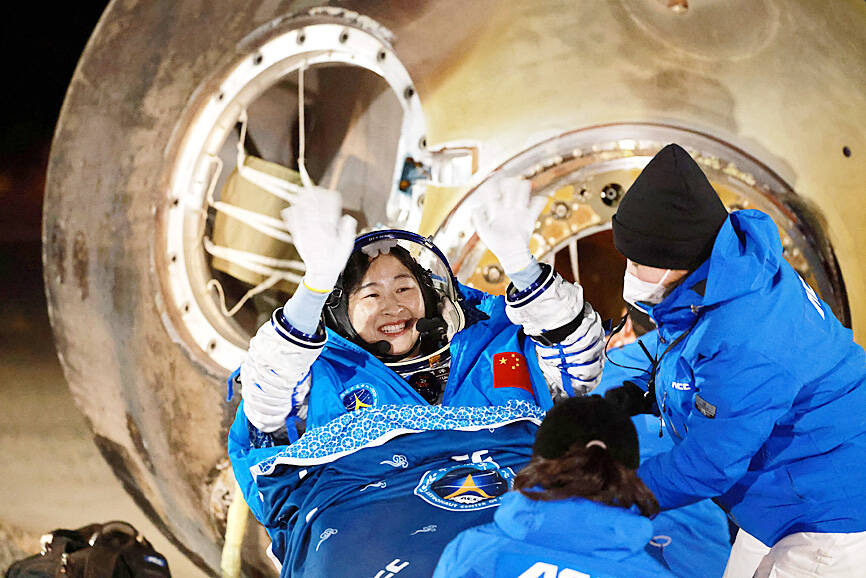Three Chinese astronauts on Sunday safely returned to Earth after six months aboard the Tiangong space station, state media quoted the country’s space agency as saying, with their mission deemed a “complete success.”
The team, which had been aboard the station since early June, touched down at the Dongfeng landing site in Inner Mongolia at 8:09pm, Xinhua news agency said, citing the China Manned Space Agency.
Medical personnel said they were in good health, the report said.

Photo: Reuters
The Tiangong space station is the crown jewel of Beijing’s ambitious space program — which has landed robotic rovers on Mars and the moon, and made the country the third to put humans in orbit — as it looks to catch up with the US and Russia.
The three Shenzhou-14 astronauts — mission commander Chen Dong (陳冬), China’s first woman astronaut Liu Yang (劉洋) and teammate Cai Xuzhe (蔡旭哲) — had been tasked with overseeing the final stages of construction of the space station.
The last module docked with Tiangong’s core structure last month, state media said — a key step in its completion by year’s end.
“I am honored to witness the formation of our space station’s basic configuration,” said Chen, an air force pilot who became the first Chinese astronaut to stay in orbit for more than 200 days.
The team has handed the baton to the Shenzhou-15 crew — China’s first crew handover in orbit.
China has been excluded from the International Space Station (ISS) since 2011, when the US banned NASA from engaging with the country.
Once completed, the Tiangong space station is expected to have a mass of 90 tonnes — about one-quarter of the ISS — or similar in size to the Soviet-built Mir station that orbited Earth from the 1980s until 2001.
Tiangong, which means “heavenly palace,” is to operate for about a decade and host a variety of experiments in near-zero gravity.

Chinese President Xi Jinping (習近平) launched a week-long diplomatic blitz of South America on Thursday by inaugurating a massive deep-water port in Peru, a US$1.3 billion investment by Beijing as it seeks to expand trade and influence on the continent. With China’s demand for agricultural goods and metals from Latin America growing, Xi will participate in the APEC summit in Lima then head to the Group of 20 summit in Rio de Janeiro next week, where he will also make a state visit to Brazil. Xi and Peruvian President Dina Boluarte participated on Thursday by video link in the opening

‘HARD-HEADED’: Some people did not evacuate to protect their property or because they were skeptical of the warnings, a disaster agency official said Typhoon Man-yi yesterday slammed into the Philippines’ most populous island, with the national weather service warning of flooding, landslides and huge waves as the storm sweeps across the archipelago nation. Man-yi was still packing maximum sustained winds of 185kph after making its first landfall late on Saturday on lightly populated Catanduanes island. More than 1.2 million people fled their homes ahead of Man-yi as the weather forecaster warned of a “life-threatening” effect from the powerful storm, which follows an unusual streak of violent weather. Man-yi uprooted trees, brought down power lines and smashed flimsy houses to pieces after hitting Catanduanes in the typhoon-prone

HOPEFUL FOR PEACE: Zelenskiy said that the war would ‘end sooner’ with Trump and that Ukraine must do all it can to ensure the fighting ends next year Russia’s state-owned gas company Gazprom early yesterday suspended gas deliveries via Ukraine, Vienna-based utility OMV said, in a development that signals a fast-approaching end of Moscow’s last gas flows to Europe. Russia’s oldest gas-export route to Europe, a pipeline dating back to Soviet days via Ukraine, is set to shut at the end of this year. Ukraine has said it would not extend the transit agreement with Russian state-owned Gazprom to deprive Russia of profits that Kyiv says help to finance the war against it. Moscow’s suspension of gas for Austria, the main receiver of gas via Ukraine, means Russia now only

North Korean leader Kim Jong-un renewed his call for a “limitless” expansion of his military nuclear program to counter US-led threats in comments reported yesterday that were his first direct criticism toward Washington since US president-elect Donald Trump’s electoral victory on Oct. 6. At a conference with army officials on Friday, Kim condemned the US for updating its nuclear deterrence strategies with South Korea and solidifying three-way military cooperation involving Japan, which he portrayed as an “Asian NATO” that was escalating tensions and instability in the region. Kim also criticized the US over its support of Ukraine against a prolonged Russian invasion.